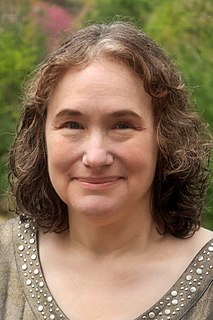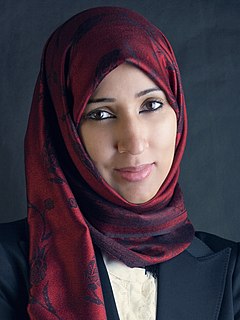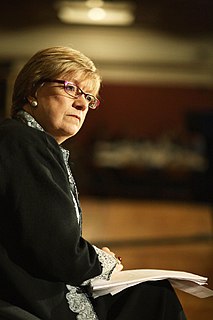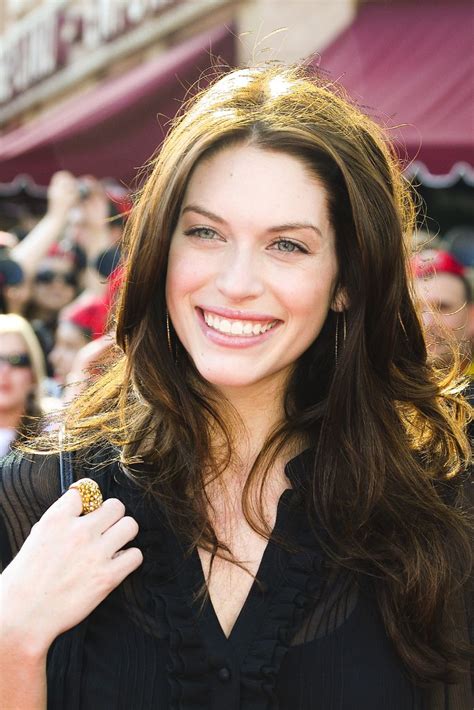A Quote by Vilayanur S. Ramachandran
My mother was religious; she was knowledgeable about mythology and scriptures; she could tell the metaphysical nuances and make the story come to life with their deeper significance. The current generation is missing out on this.
Related Quotes
...fact was she knew more about them than she knew about herself, having never had the map to discover what she was like. Could she sing? (Was it nice to hear when she did?) Was she pretty? Was she a good friend? Could she have been a loving mother? A faithful wife? Have I got a sister and does she favor me? If my mother knew me would she like me? (140)
The story of my grandmother is that of a French woman from the provinces who through her perseverance and thirst for knowledge worked her way up to become the head of a school. She belonged to a generation that didn't travel much. But she believed in Europe and she wanted Europe. And she read a lot - she knew mythology, literature and the classics very well. She passed that on to me, along with the conviction that you can earn your own position in society.
Sometimes she wished for someone she could tell about her problems, just to be able to say, ‘I’m in love with a man and I can’t have him.’ But that would only lead to questions she couldn’t answer, so she kept the secret and the pain inside, hoping someday she would no longer feel as if half of her were missing.
She smiled. She knew she was dying. But it did not matter any longer. She had known something which no human words could ever tell and she knew it now. She had been awaiting it and she felt it, as if it had been, as if she had lived it. Life had been, if only because she had known it could be, and she felt it now as a hymn without sound, deep under the little whole that dripped red drops into the snow, deeper than that from which the red drops came. A moment or an eternity- did it matter? Life, undefeated, existed and could exist. She smiled, her last smile, to so much that had been possible.
A lot of people say that Eleanor Roosevelt wasn't a good mother. And there are two pieces to that story. One is, when they were very young, she was not a good mother. She was an unhappy mother. She was an unhappy wife. She had never known what it was to be a good mother. She didn't have a good mother of her own. And so there's a kind of parenting that doesn't happen.
I've known a lot of very religious people. My mother is very religious, but she was also very - is very private about it. She - when I was growing up, she never went to church. She just prayed and read her Bible and kept it to herself. So I'm not from a background of flamboyant believers. It's much more a personal issue.
He began to trace a pattern on the table with the nail of his thumb. "She kept saying she wanted to keep things exactly the way they were, and that she wished she could stop everything from changing. She got really nervous, like, talking about the future. She once told me that she could see herself now, and she could also see the kind of life she wanted to have - kids, husband, suburbs, you know - but she couldn't figure out how to get from point A to point B.
But when she turned her back to the lights, she saw that the night was so dark...She could not see the stars. The world felt as high as the depthless night sky and deeper than she could know. She understood, suddenly and keenly, that she was too small to run away, and she sat on the damp ground and cried.
My mother lived her life through movies and books - she read everything there was to read. And she read to me every night. I never went to sleep without her reading to me. And she fantasized about the book and she would talk about it, the place, and you would think that after she read the book and after she told you stories about it, that she had actually been there. I learned about story from her, and I learned the value of a great story, and the value of great characters.
Dad himself used to tell a story about one time when Mother went off to fill a lecture engagement and left him in charge at home. When Mother returned, she asked him if everything had run smoothly. Didn't have any trouble except with that one over there,' he replied. 'But a spanking brought him into line.' Mother could handle any crisis without losing her composure. That's not one of ours, dear,' she said. 'He belongs next door.





































